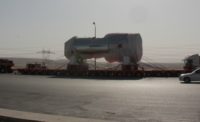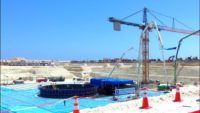Egypt Issues Second Permit for $30B Nuclear Power Plant Work
Permit was issued to Russia-based Rosatom for the initiative

Egyptian and Russian experts tour the plant project site in El Dabaa.
Photo Courtesy Rosatom
Russia’s nuclear energy giant Rosatom was granted a new permit March 29 for construction of an additional unit at Egypt’s El Dabaa nuclear power plant site on the Mediterranean coast, 184 miles northwest of Cairo.
When complete, it will be Egypt's first nuclear power plant.
This is the second permit issued since August 2022, when Rosatom announced it had secured a license from the Egyptian Nuclear and Radiological Regulatory Authority to develop the first unit of the four-unit, $30 billion nuclear project.
Each of the units has a capacity of 1.2GW and is intended to support Egypt’s drive to diversify its power sources and improve reliability of the national power supply system.
Rosatom says the construction license for the third unit was granted after an authority inspection team declared the site ready for the project. Like the first unit, the third one will be constructed with a VVER-1200 pressurized water reactor that belongs to the Generation III+ class of the reactor design, an improved version of Generation III in terms of performance.
The company, which has so far largely been spared from international sanctions imposed on other Russian firms over the war in Ukraine, says Generation III+ has additional safety systems including capability to “prevent radioactive substances from getting out of hermetically sealed containment in cases of emergency.”
The VVER-1200 has a 20% higher power capacity while having a size comparable to VVER-1000, says Rosatom.
“Receipt of the license for construction of unit three is the result of huge effort for the preparation of the license documentation and another important step that brings us closer to the main period of construction of the unit,” said Alexander Korchagin, senior vice president for NPP Construction Projects Management ASE JSC, one of Rosatom’s engineering divisions.
Meanwhile, Rosatom announced on March 21 that it has delivered the core catcher, which is equipment deployed to at nuclear power plants to catch the molten core material of a reactor if there is a nuclear meltdown, preventing it from escaping the containment building.
Rosatom will also supply the facility with nuclear fuel for its entire 60-year lifespan of the reactors. It will also build special storage and supply containers to store spend nuclear fuel.



